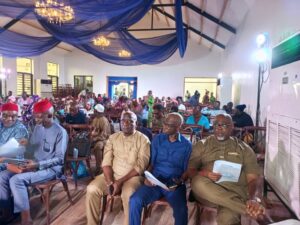FG pension bond: A step towards pension stability

Ivor Takor
Report by the Director, Centre for Pension Rights Advocacy, IvoTakor, mni Esq.
The recent revelation by the Director General of the National Pension Commission (PenCom), Omolola Oloworaran, during an interview on the Nigerian Television Authority (NTA), that the Federal Government is on the verge of issuing a pension bond to address Pension Accrued Rights, pension increases since 2007, and the Pension Protection Fund for federal civil servants, is a welcome development.
For years, retired federal public servants have faced delays in receiving their pension benefits due to the non-funding or inadequate funding of accrued rights. As rightly pointed out by the DG of PenCom, these issues are rooted in the government’s failure to consistently meet its obligations under the Pension Reform Act (PRA) 2014.
Legal Provisions Supporting Pension Accrued Rights
Section 15 of the PRA 2014 clearly provides for the accrued pension rights of federal public servants. Section 15(4) states:
“The accrued pension rights and entitlements of employees of the Public Service of the Federation as provided for under subsection (1) of this Section shall be reviewed by the Federal Government of Nigeria from time to time in line with Section 173(3) of the Constitution of the Federal Republic of Nigeria 1999 (as amended), provided that the variation so derived from salary reviews shall be provided by the Federal Government and credited directly into the retirement savings account of individual retirees.” A similar provision applies to employees of the Federal Capital Territory under Section 15(5).
Section 39(3) of PRA 2014 provides that: “Without prejudice to sub-section 2 of this section, the Commission shall, by the end of every calendar year, determine the adequacy of the Redemption Fund against the projected pension liability of Government arising from voluntary and mandatory retirements, death of employees in service and the right of pensioners to pension review in line with section 173(3) of the 1999 Constitution (as amended), and advise the Budget Office of the Federation of shortfall, if any.”
Section 173(3) of the Constitution unequivocally requires that pensions be reviewed concurrently with federal civil service salary reviews, which includes adjustments of the national minimum wage. This mandate is clear and binding, ensuring that pensioners’ income reflects current economic realities.
However, these rights have often been underfunded, leading to widespread complaints among retirees about delays in payments and lack of pension adjustments. The pension bond proposed by the government is expected to provide a structured funding mechanism to address these concerns.
Pension Protection Fund and Minimum Pension Guarantee
Another critical aspect of the pension bond initiative is the funding of the Pension Protection Fund, as provided in Section 82 of the PRA 2014. This fund is crucial for implementing the Minimum Pension Guarantee under Section 84(1), which states:
“All Retirement Savings Account holders who have contributed to a licensed Pension Fund Administrator for a number of years to be specified by the Commission shall be entitled to a guaranteed minimum pension as may be specified from time to time by the Commission.”
The promise of a Guaranteed Minimum Pension under the Contributory Pension Scheme (CPS) was a beacon of hope for Nigerian workers. It was meant to ensure that after years of service, retirees would not be left destitute. The delay in implementing this provision in the pension law is a betrayal of trust placed in the system by contributors to the CPS.
The absence of a properly funded Pension Protection Fund has been a major reason why PenCom has not been able to introduce a Minimum Pension Guarantee. Section 82(2) outlines the sources of funding for this crucial fund, including:
1.An annual subvention of 1% of the total monthly wage bill payable to employees in the public service of the federation.
2.An annual protection levy paid by PenCom and all licensed pension operators.
3.Income from the investment of the Pension Protection Fund.
With the N107 billion proposed in the Federal Government Pension Bond allocated to cover the 1% wage bill subvention, it is now imperative for PenCom to act on the second funding source.
The Role of PenCom Moving Forward
To ensure the successful implementation of the pension bond initiative, PenCom must take the following actions:
1.Determine the Annual Protection Levy: As required by Section 82(2)(b), PenCom must establish and publicly communicate the annual protection levy rate for both the Commission and all licensed pension operators for the period covered by the Federal Government bond.
2.Ensure Proper Utilization of the Pension Protection Fund: The fund must be directed towards its intended purposes, including:
•Funding the Minimum Pension Guarantee.
•Compensating eligible pensioners for shortfalls or financial losses from investment activities.
•Providing additional protections as necessary.
3.Enhance Transparency and Public Awareness: Given the history of pension delays and underfunding, PenCom must ensure that the public, particularly pensioners and contributors, are fully informed about the implementation process of the pension bond and its impact on their benefits.
Conclusion
The introduction of the Federal Government Pension Bond is a significant step toward addressing the persistent pension funding issues that have plagued retired federal public servants. However, for this initiative to succeed, PenCom must take proactive measures to implement all aspects of the Pension Protection Fund, including the enforcement of the annual protection levy on pension operators. Transparency, accountability, and strict adherence to the Pension Reform Act will be key to restoring confidence in Nigeria’s pension system.




